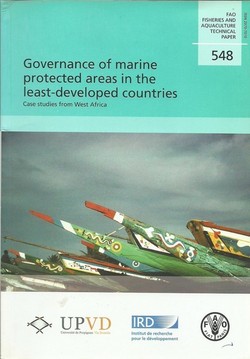
Governance of marine protected areas in the least-developed countries
Case studies from West Africa
By
Jean-Yves Weigel, Francois Feral and Bertrand Cazalet
Introduction
A Topical matter
The concept of governance is increasingly concerned with stakeholder representation and participation and with the need to find several explanations to the problems affecting fisheries management beyond a sectoral approach (Jentoft, 2006). A governance approach is different from a management one: the focus is not on technical or economic solutions to sociopolitical problems but rather on the power relations between actors that determine the application of norms. The transterritorial nature of fishing activities, illustrated by the overlap between the different fishing territories and itineraries (for example, between a marine protected area [MPA] and the adjacent territory) can better be taken into account by a governance-based approach that also integrates better the consequences of globalization such as the redistribution of value-added and increasing inequalities (Weigel and Dahou, 2007).
Some years ago, in proposing a social science research programme applied to MPAs and their governance, Christie et al. (2003) already stressed the importance of the political, social and economic issues expressed in the concept of governance, insisting on the fact that the social and political dimensions needed to be adapted to local requirements and specificities (Christie et al., 2003, p. 24). The popularization of the concept of governance within the academic world of fisheries sciences signalled the end of the natural sciences hegemony and the emergence of a multidisciplinary approach, marking the end of an era characterized by “the historical difficulty or reluctance to fully integrate social science disciplines into operational fishery science” (Garcia and Charles, 2008, p. 16).
The importance of governance in protected areas was explicitly recognized in several recommendations from the Johannesburg World Summit on Sustainable Development (2002) and the World Parks Congress in Durban (2003), including one relating to the establishment of a global system of coastal and marine protected areas networks that ought to cover 20–30 percent of the maritime surface by 2012, and another relating to the protection of marine biological diversity and ecosystem processes.
The wording of these recommendations highlights the need for coherence between natural resource conservation and socio-economic development policies when anything other than a strict nature reserve is being considered. These recommendations call for the recognition of and the respect for customary property, access and use of local populations. They fit within the general trend of recognizing the fundamental role of social, cultural, economic and institutional factors in conservation, aiming to increase civil-society involvement in the decision-making process.
Contents
<!--Introduction
<!--Marine protected area governance issues in the least-developed countries.
<!--Demographic and economic constraints on MPA governance in LDCs.
<!--The legal context of governance of marine protected areas in the least-developed countries: legal system.
<!--Governance systems of marine protected areas in least-developed countries: analytical framework, characterization and weaknesses
<!--The reconfiguration of MPA governance and public policies
<!--Conclusion



ساحة النقاش